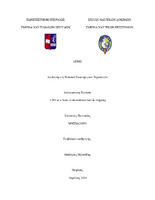LNG as a basic or transitional fuel in shipping

Προβολή/
Λέξεις κλειδιά
LNG ; Green fuel ; Transition to zero-carbon fuels ; Environmental factors ; Economic factors ; Maritime industryΠερίληψη
This paper provides a comprehensive exploration of Liquefied Natural Gas (LNG) as a maritime
fuel, addressing its technical, environmental, economic, and industry adoption aspects. The study
reviews LNG's historical context, current status, and trends, emphasizing its potential to meet
stringent emission standards. Technical considerations encompass LNG storage, handling, engine
technologies, and safety. Environmental impacts, regulatory frameworks, and economic viability
are analyzed, including case studies illustrating industry adoption. The paper scrutinizes LNG's
role as a basic or transitional fuel, concluding that it serves as a transitional solution. Despite
offering environmental benefits, challenges like methane slip and evolving regulatory targets
position LNG as a temporary measure in the industry's shift toward zero-carbon fuels. The analysis
contributes valuable insights for all the involved parties navigating the evolving landscape of
sustainable shipping fuel alternatives, recognizing LNG's pivotal but temporary role in fostering
environmentally conscious practices within the maritime sector.


